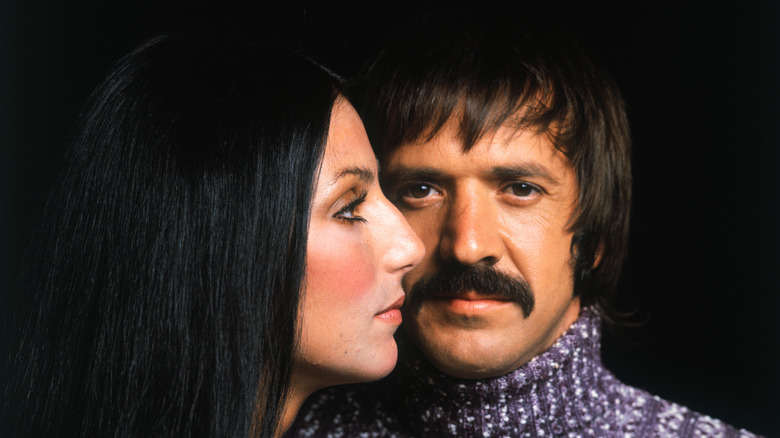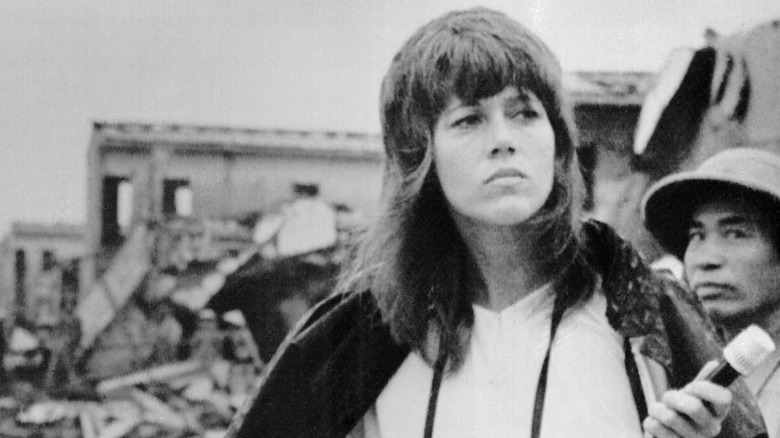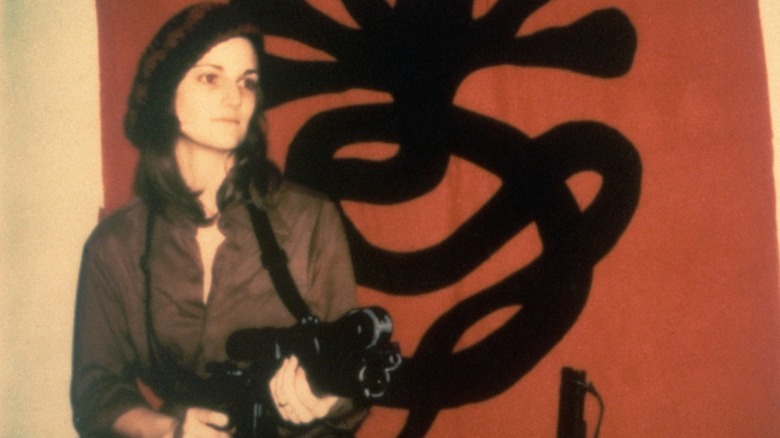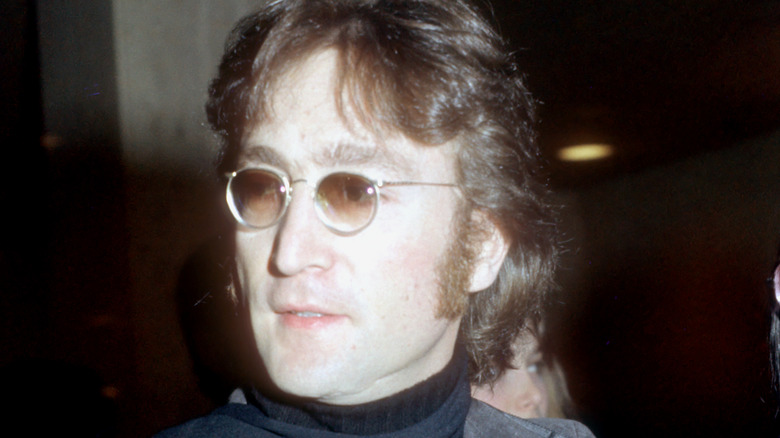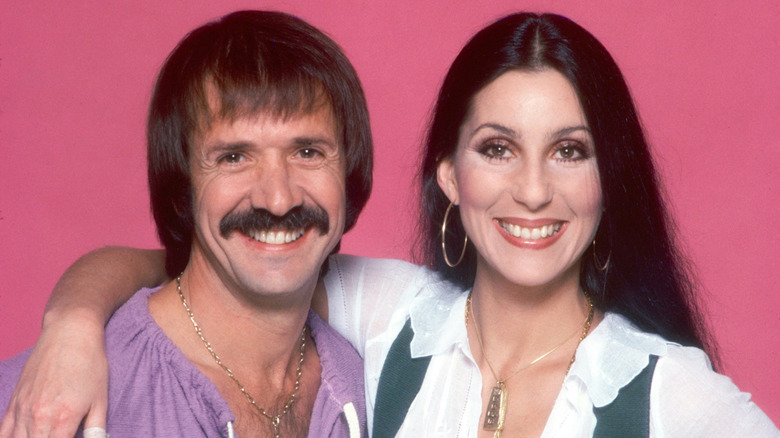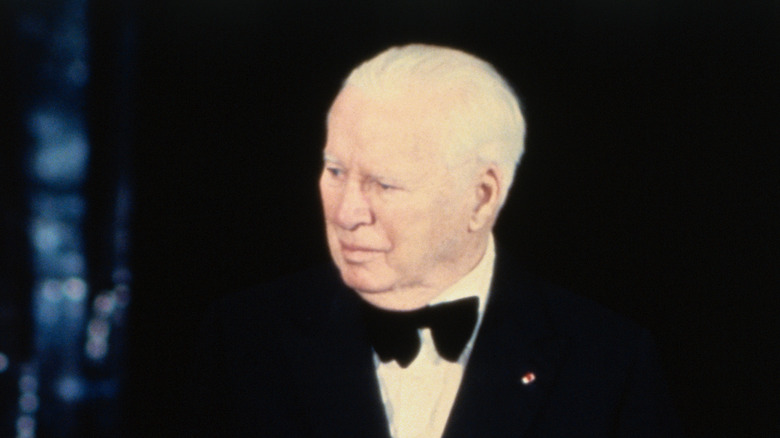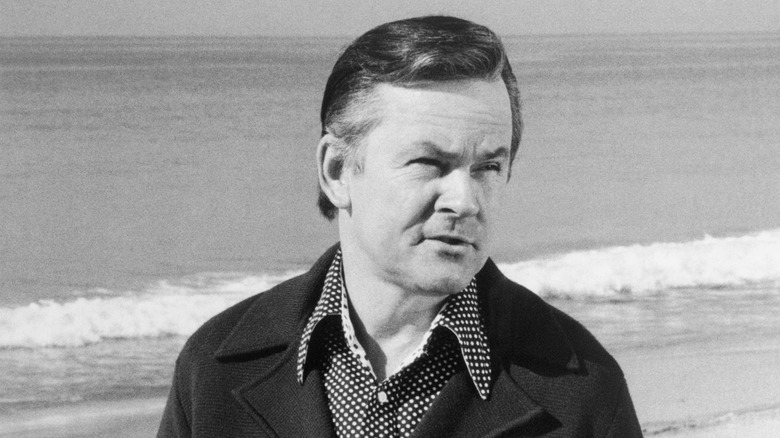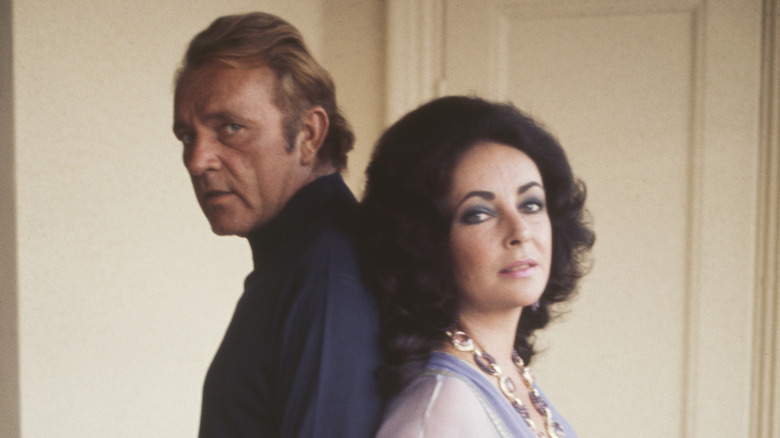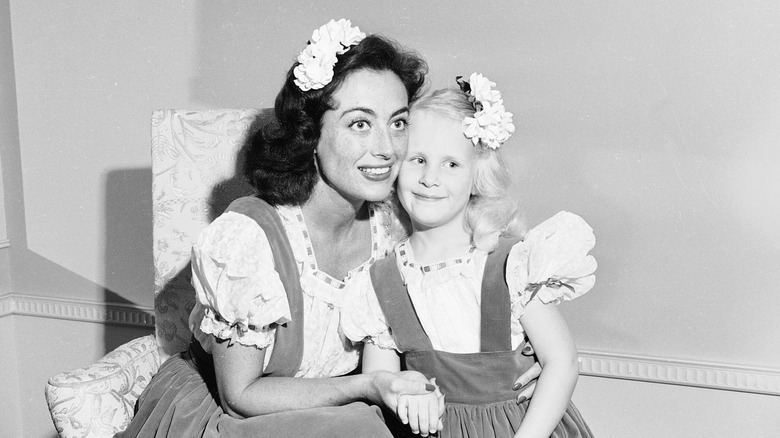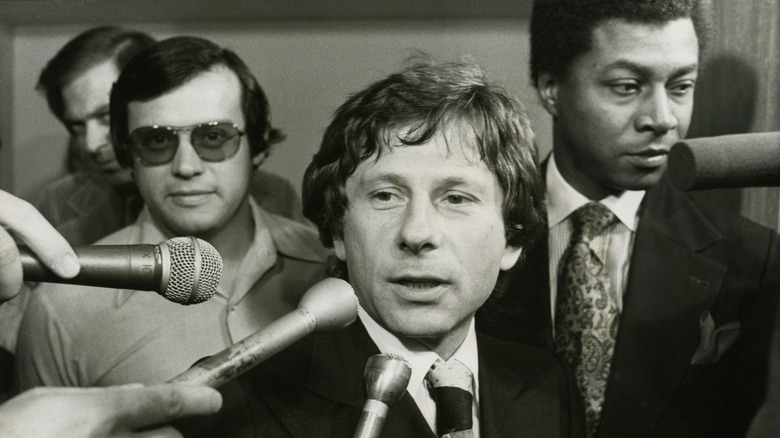10 Celebrity Scandals That Completely Rocked The 1970s
For as long as there have been celebrities, there have been celebrity scandals. In fact, an entire industry has developed around the foibles of the famous — where would the National Enquirer, TMZ and other purveyors of celebrity dirt be if not for their perpetual stream of bad behavior?
The 1970s proved to be a particularly rich decade in this respect, with "sex, drugs, and rock 'n' roll" becoming the rallying cry, and no shortage of famous folks eager to partake in all three. Celebrity misconduct ran the gamut, from a former Beatle's year-and-a-half-long drinking binge to the movie-star couple whose turbulent, scandal-ridden romance saw them marry and divorce — and then do it all over again. Then there's the acclaimed film director who fled the U.S. after being charged with a heinous crime, and the wealthy heiress who turned terrorist. Truth be told, there was a lot of material to keep supermarket tabloids crammed with dirt during that era.
Jane Fonda drew rage by visiting Vietnam
Daughter of beloved movie star Henry Fonda, the stunning transformation of Jane Fonda saw her shift from nepo baby to established star in her own right — and a fervent activist protesting the Vietnam War. Determined to get a firsthand look at what was actually happening there, in 1972 she paid a controversial visit to Vietnam. She became a figure of scorn and derision for a wide swath of the country when she posed for a photo while atop a North Vietnamese anti-aircraft gun. Not surprisingly, Fonda was hit with extreme backlash, accused of being a traitor and nicknamed "Hanoi Jane" when she returned.
While Fonda was later vindicated after the war ended and the truth began leaking out, her Vietnam visit dogged her for decades. In 2011, she addressed the still-simmering scandal in a post she wrote on her website, explaining that her trip materialized after meeting with U.S. soldiers serving in Vietnam, and being horrified by their stories. "I was infuriated as I learned just how much our soldiers were being lied to about why we were fighting in Vietnam and I was anguished each time I would be with a young man who was traumatized by his experiences," she wrote.
As for that controversial photo, Fonda believed she'd been manipulated by her North Vietnamese hosts, but ultimately accepted full responsibility for the gaffe. "It was my mistake and I have paid and continue to pay a heavy price for it," she wrote, adding that posing for that photo is something she "will regret to my dying day."
Heiress Patty Hearst joined a terrorist group and robbed a bank
Patty Hearst grew up in the lap of luxury, heiress to the Hearst publishing empire built by her grandfather, William Randolph Hearst. In February 1974, while attending college, 19-year-old Patty was kidnapped by a terrorist organization calling itself the Symbionese Liberation Army (SLA). Despite her family agreeing to pay a ransom, Hearst wasn't released. While being held captive, Hearst came to adopt the group's political ideology. That April, the group issued an audiotape in which Hearst declared that she was joining the SLA, of her own free will, and was now going by Tania, not Patty. Shortly after, she participated in a bank robbery, with surveillance footage showing her armed with a firearm and threatening bank customers.
The headlines were sensational, and Hearst remained on the lam for more than a year until she was finally arrested in September 1975. She was charged with various crimes, including bank robbery. Her family hired famed lawyer F. Lee Bailey, whose defense contended that Hearst was suffering from Stockholm syndrome, a psychological phenomenon in which kidnapping victims begin to develop sympathetic feelings for their captors. The jury, however, didn't buy it; she was convicted and sentenced to seven years in prison. Her sentence was later commuted by President Jimmy Carter after she'd served just 22 months.
Following her release, Hearst married her bodyguard, former San Francisco cop Bernard Show. Years later, filmmaker John Waters cast her in his 1990 film "Cry-Baby,” which sparked an unexpected acting career that included a few of Waters' other films, in addition to movies such as "Bio-Dome," and TV series including "Son of the Beach" and "Veronica Mars."
John Lennon had a drunken 'Lost Weekend' after splitting from Yoko
During the late 1960s and early' 70s, few celebrity couples were more ubiquitous than John Lennon and Yoko Ono. From their "bed-ins" and other peace-promoting publicity stunts to co-hosting "The Mike Douglas Show" for an entire week, the former Beatle and his avant-garde artist wife were seemingly everywhere.
However, what fans didn't know about their relationship was that cracks had formed, and in November 1973 they abruptly split up. Lennon immediately took up with the couple's assistant, May Pang, thus entering an 18-month period of drunken debauchery now known as his "Lost Weekend." Lennon's partner in crime was singer-songwriter Harry Nilsson, and the tipsy twosome tore up LA. One infamous incident occurred when Lennon showed up at the Troubadour club with a sanitary napkin affixed to his head. As Circus magazine (via The Guardian) reported, the club's server brought the boozy Beatle drink after drink until, when he began to leave, she asked if he was planning to tip her. "Don't you know who I am?" Lennon slurred. "You're some jerk with a Kotex around his head," she responded. He left in fury — without tipping. Another night, in that same club, Lennon and Nilsson drunkenly heckled a performance by the Smothers Brothers. Lennon had to be forcibly removed, knocking over several tables as he was thrown out of the club by bouncers. On the way out, he threw a punch at a 50-ish woman who attempted to take his photo. She filed charges, alleging battery.
Ultimately, he managed to reconciled with Ono, with the two getting back together in February 1975. They renewed their vows the following month, and remained together until his 1980 murder.
Sonny and Cher got divorced — then reluctantly reunited for a new TV show after their solo shows bombed
Folk-pop duo Sonny and Cher made a splash in the mid-1960s with such hits as "Bang Bang," "The Beat Goes On," and "I Got You Babe." By the end of the decade, however, the hits stopped coming and the crowds grew smaller. Taking their act from theaters to nightclubs, they retooled into a cabaret act that featured a heavy dose of comedy after realizing their onstage banter garnered big laughs. Television execs took notice, and "The Sonny & Cher Comedy Hour" debuted on CBS in 1971, becoming a monster hit that placed them back on top.
Behind the camera, however, their marriage was crumbling. In 1974, at the height of the show's success, they split up, with Cher describing the marriage (via The Independent) as "involuntary servitude." Their divorce was finalized in 1975, and their show canceled. They returned with individual variety shows — "Cher" and "The Sonny Comedy Revue" — but both shows tanked in the ratings.
In the midst of all this drama, Cher married Allman Brothers singer/keyboardist Gregg Allman. Cher's relationship with Allman was lightning fast, and she filed for divorce just nine days later (although they later reconciled, and had a baby together, Elijah Blue Allman, born in July 1976). Meanwhile, she reunited with Sonny Bono for one more kick at the television can, with "The Sonny & Cher Show" debuting in the fall of 1976. Given all the tragic details about the end of Sonny and Cher's marriage, viewers who loved watching spouses playfully bicker didn't feel the same about divorced exes, and the show was quickly canceled. They went their separate ways, personally and professionally, once and for all.
Bungling grave robbers stole the corpse of silent film star Charlie Chaplin and held it for ransom
Silent movie icon Charlie Chaplin experienced his fair share of scandal, thanks to the shockingly young ages of his wives — two of whom were 16 when he married them, while his fourth and final spouse, Oona O'Neil, was just 18 when she wed the 53-year-old Little Tramp. However, the biggest scandal to engulf Chaplin during the 1970s was unique in that he was dead at the time.
Chaplin died at age 88 in December 1977, buried in a small town in Switzerland. The following December, a 24-year-old Polish refugee with money problems hatched a not-so-brilliant plan to dig up Chaplin's corpse and hold it for ransom. With the help of an accomplice, he made off with Chaplin's remains, and demanded $600,000 for their return. Chaplin's widow refused. "Charlie would have thought it rather ridiculous," she remarked, as reported by Smithsonian Magazine.
Police monitored local pay phones, and before long the grave robbers were caught. The "brains" behind the criminal enterprise, Roman Wardas, was sentenced to four years in prison, while his accomplice, Gantscho Ganev, got off easy with an 18-month suspended sentence.
The murder of beloved Hogan's Heroes star Bob Crane revealed his kinky sex life
In retrospect, it's fair to say that a wacky sitcom set in a Nazi POW camp seemed unlikely to become a hit. Yet "Hogan's Heroes" proved to be a ratings smash, largely due to the charm of its star, Bob Crane, who starred as the titular Col. Hogan from 1965 until the show's cancellation in 1971.
After "Hogan's Heroes," the 1970s were not nearly as successful for the radio deejay-turned-actor, thanks to a big-screen bomb (Disney's 1973 flop "Superdad"), and the failure of his 1975 solo sitcom, "The Bob Crane Show." His career continued to flounder until he was brutally murdered in June 1978. The police investigation into the homicide — which has yet to be solved — uncovered shocking details about Crane's sordid personal life when cops discovered numerous photo albums featuring Crane and various women engaged in all manner of sex acts. As it turned out, not all those women had known they were being secretly photographed for Crane's personal porn stash, while it soon became clear that a key reason for Crane's stalled career had been his out-of-control sex addiction.
The circumstances underlying Crane's murder made many unsavory headlines, and his killer has never been found. Despite the years that have passed, the public has remained fascinated with the seedy details of his death, which was dramatized in the 2002 film "Auto Focus," starring Greg Kinnear as Crane.
Elizabeth Taylor's roller-coaster romance with Richard Burton was the news of the decade
Name a Hollywood romance more tumultuous than that of Richard Burton and iconic movie star Elizabeth Taylor. The Welsh thespian and the former child star first met on the set of the 1963 film "Cleopatra," sparking a notorious affair that ended both their marriages (Burton left wife Sybil Williams, while Taylor ditched husband Eddie Fisher — a relationship that began in scandal while Fisher was still married to beloved movie star Debbie Reynolds). Burton and Taylor married in 1964, with the volatile and tempestuous antics of the "battling Burtons" selling countless tabloids, replete with tales of vicious fights, smashed televisions, and trashed hotel rooms, fueled by gallons of booze. "Richard loses his temper with true enjoyment. It's beautiful to watch," Taylor once said, via Vanity Fair. "Our fights are delightful screaming matches, and Richard is rather like a small atom bomb going off."
All those blow-ups finally took their toll, and they divorced in 1974. However, it didn't take. They reconciled about a year later, and in 1975 tied the knot for a second time in a private ceremony held in Botswana — with Burton becoming the only husband Elizabeth Taylor married twice. It didn't take them long to realize they'd made a terrible mistake. Less than a year after their second wedding, the two divorced again.
Both went on to marry twice more, although Taylor secretly hoped she and Burton would get hitched one more time. "In my heart, I will always believe we would have been married a third and final time," Taylor told the authors of "Furious Love: Elizabeth Taylor, Richard Burton, and the Marriage of the Century."
Joan Crawford's daughter accused her of unspeakable cruelty in Mommie Dearest
One of Hollywood's biggest stars during the 1930s and '40s, Joan Crawford lived a life of glamor and elegance, as did her adopted son and daughter. Or at least that's what the PR spin insisted, until Crawford's daughter, Christina Crawford, declared the whole thing to be an ugly sham in her 1979 tell-all, "Mommie Dearest."
Published in 1978 — the year after the actor's death — "Mommie Dearest" became the prototypical "poison pen" memoir, depicting the "Mildred Pierce" star as a sadistic alcoholic prone to violent outbursts of rage, habitually beating, and abusing both Christina and her brother. The book's more shocking accusations included Christina's claims that her mother, who used only wooden hangers, discovered Christina had hung an article of clothing on a wire hanger, and furiously beat her with said hanger until her ears were ringing. She also claimed that her mother had shredded her favorite dress as a punishment, and once starved her for several days after she refused to eat a rare, bloody steak.
The book became a sensation, spawning a 1981 movie that become a camp classic thanks to Faye Dunaway's scenery-chewing portrayal of an off-her-rocker Joan Crawford. Looking back, Christina believes her mother was psychologically unwell, and was only able to get away with such abusive behavior because of her wealth and fame. "If a lot of what she did had happened today, that woman would be arrested and taken to jail," she told The Guardian.
Sex Pistols star Sid Vicious was accused of murdering girlfriend Nancy Spungen
When punk rock exploded in the late 1970s, no band better epitomized the nihilistic punk ethos than British rockers the Sex Pistols. While frontman Johnny Rotten (a.k.a. John Lydon) provided the band's snarling voice, it was spiky-haired bassist Sid Vicious (John Ritchie) who lived the lifestyle as he and girlfriend Nancy Spungen became punk's pre-eminent couple.
Their ragged romance took a dark and deadly turn when Vicious awoke one morning in a room in New York's Chelsea Hotel to find Spungen had been stabbed to death. Vicious, who was then heavily addicted to heroin, made contradictory claims. "I stabbed her, but I never meant to kill her," he told cops after his arrest, per the Independent. During that same interview with police, just 30 minutes later, he then claimed he was so out of it that he had no memory of what had taken place.
He was subsequently released on $50,000 bail — only to be arrested again and sent to New York's notorious Rikers Island after attacking the brother of singer Patti Smith with a broken beer bottle. During his time in Rikers, he attempted to detox from heroin, and was subsequently released. Hours later, he was dead from a heroin overdose, the murder case still pending. Like other scandals of the era, this one also inspired the 1986 movie "Sid and Nancy."
Director Roman Polanski fled the U.S. after being charged with the sexual assault of a 13-year-old
Director Roman Polanski endured unspeakable tragedy in 1969, when his pregnant wife, actor Sharon Tate, was slain by members of the infamous Charles Manson family. Polanski went on to earn acclaim for his subsequent movies — particularly 1974's "Chinatown," but it all came crashing down in 1977 when he was charged with drugging and sexually assaulting a 13-year-old girl. He entered a guilty plea, his lawyer having cut a deal that would see him undergo a 90-day screening process to determine his sentence. That screening recommended Polanski do no jail time, but instead be sentenced to probation.
Before the actual sentencing could take place, however, Polanski learned that the judge in the case was planning to ignore that recommendation and sentence him to hard time in federal prison. The fearful director then fled the U.S. to avoid the prospect of prison, remaining a fugitive for decades as he continued to direct critically acclaimed films in Europe.
In 2003, he won an Oscar for "The Pianist," but didn't attend the Academy Awards ceremony for fear of arrest. Finally, in 2024 the case was settled, with NBC News reporting it had been "formally dismissed." Terms of Polanski's settlement with his accuser were not made public.
